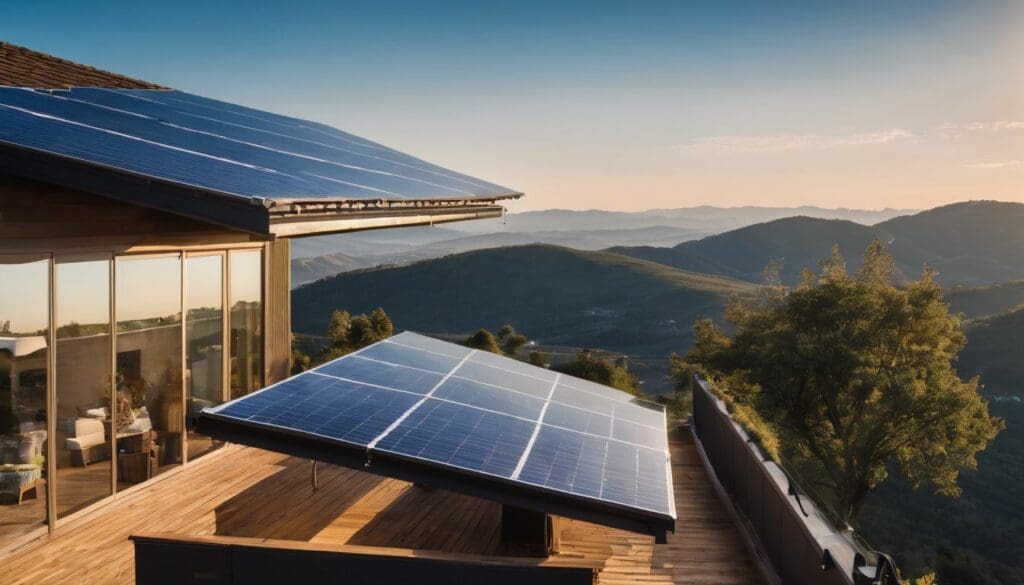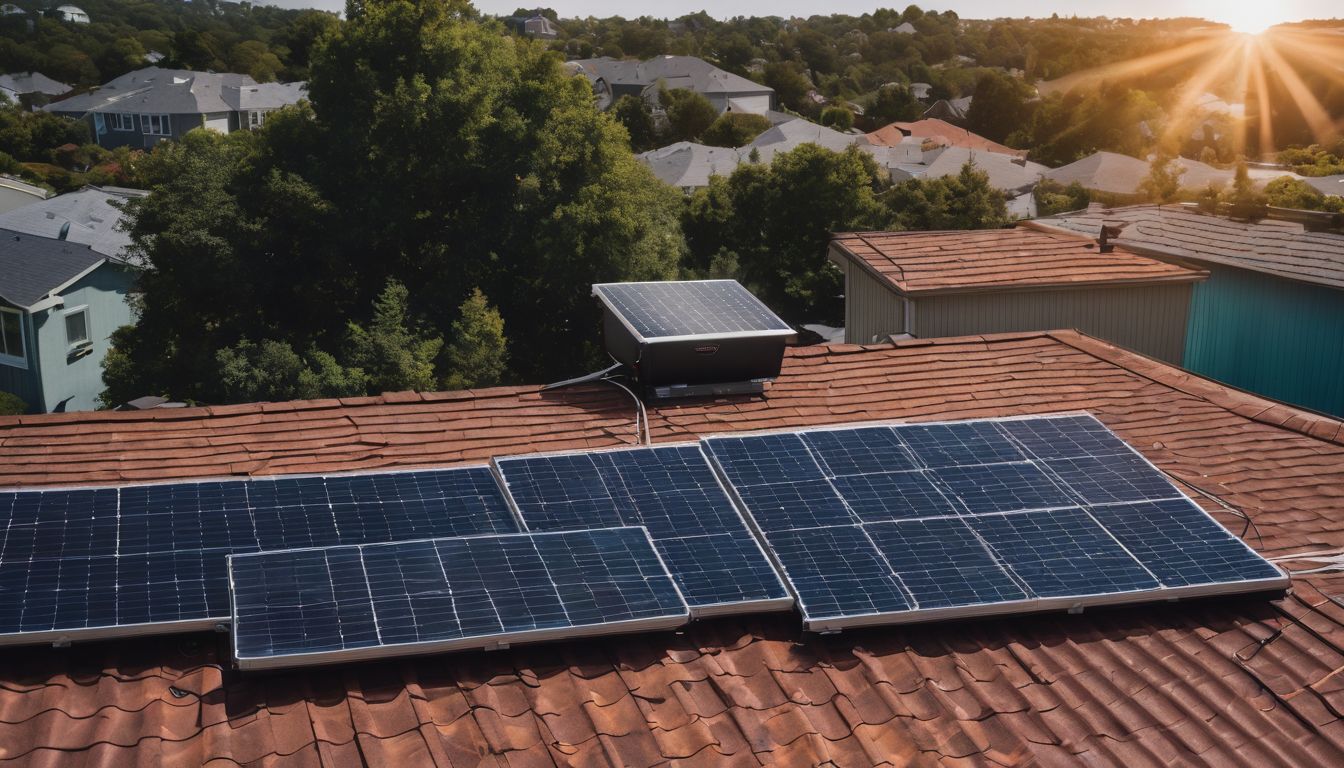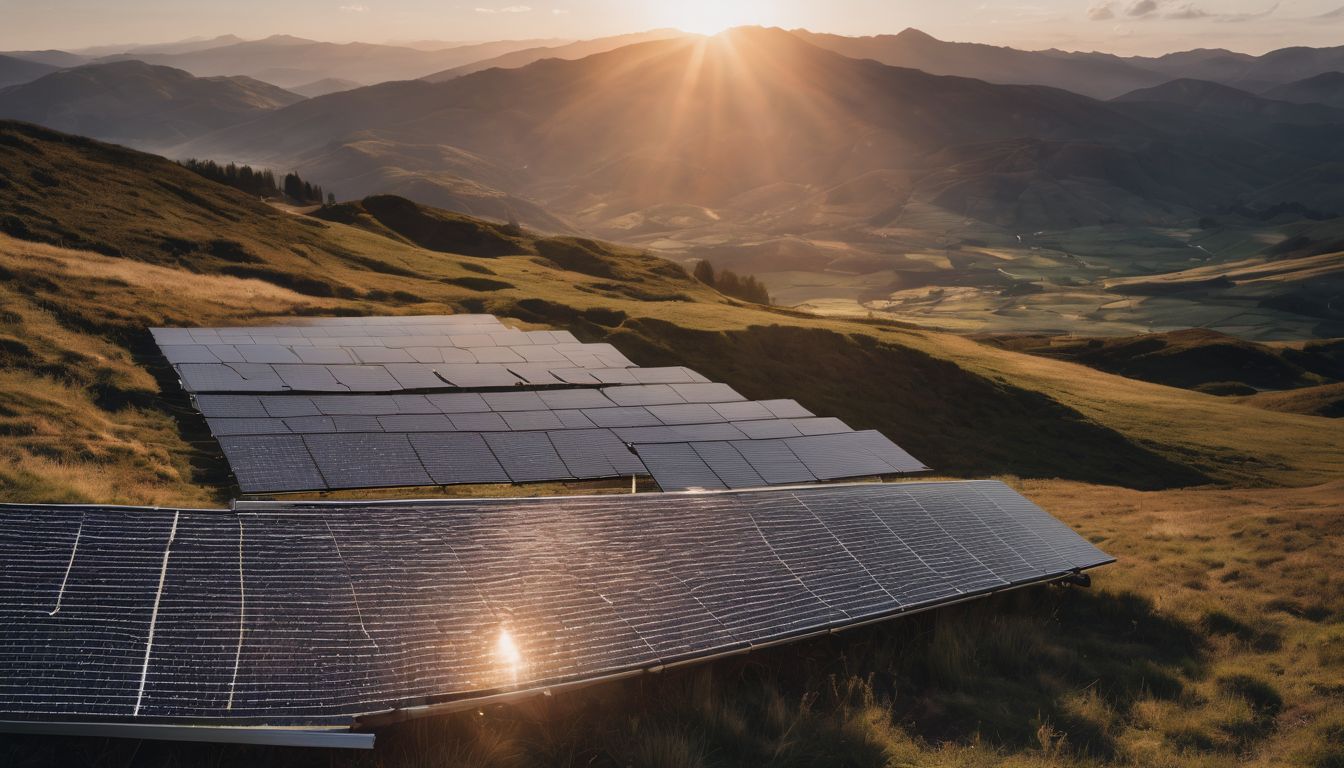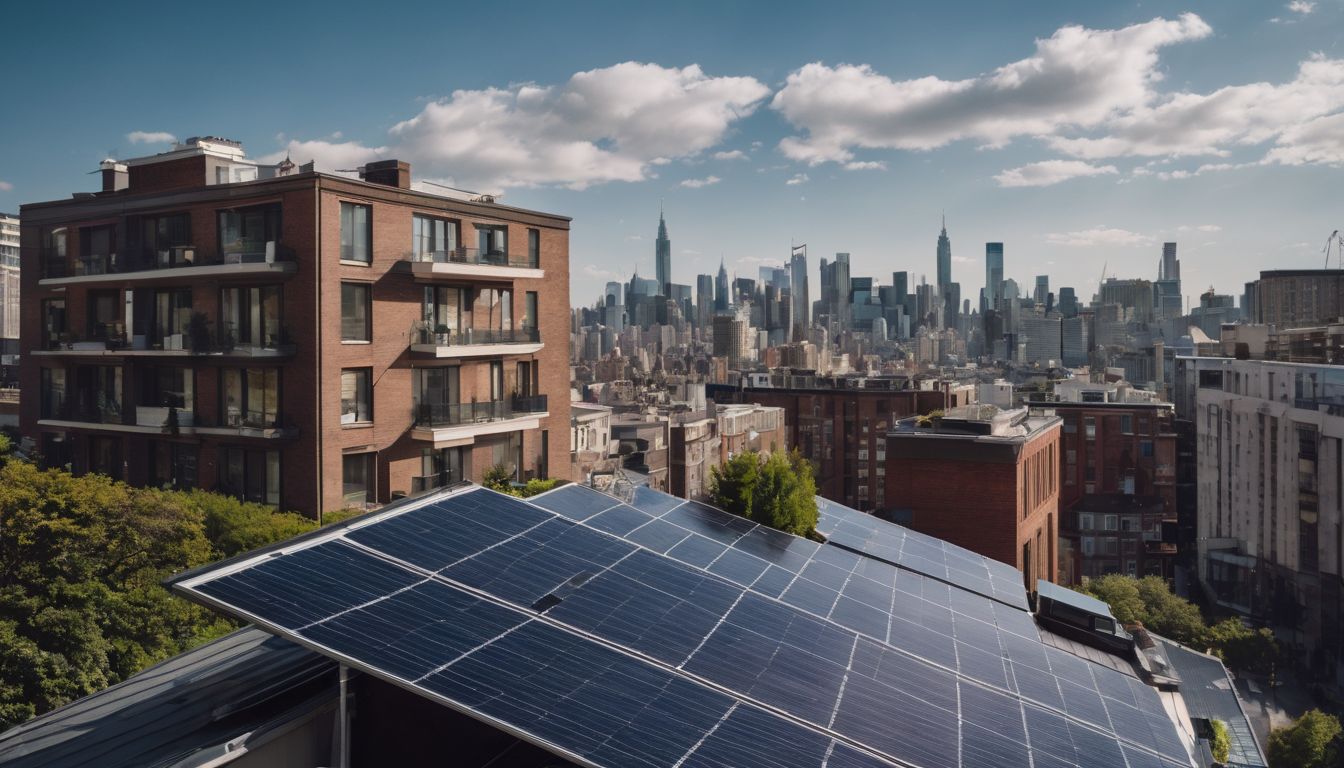As energy bills soar, many of us wonder if there’s a better way to power our homes. Solar energy is capturing the spotlight as a sustainable alternative, harnessing the sun’s power directly.
This article will guide you through the pros and cons, costs, and considerations of solar power for your residence. Let’s shine a light on whether solar is right for you.
Key Takeaways
- Solar power offers a renewable energy option that can lead to reduced electricity bills and increases in property value.
- Initial costs for solar panel installation are high but can be offset by government rebates, tax incentives, and potential savings on energy bills over time.
- The suitability of solar panels depends on the location, roof condition, and individual energy consumption of your home.
- Tax credits and rebates from governments or utility companies can help make the transition to solar power more affordable.
- When considering solar power, it’s important to evaluate the payback period, which is how long it will take for the cost savings to cover the initial investment.
What is Solar Power?
Solar power is a renewable energy source that harnesses sunlight to generate electricity for homes. It works by using photovoltaic panels to convert sunlight into usable energy.
Definition
Harnessing the sun’s energy creates solar power, a clean and renewable source of electricity ideal for residential use. This process relies on photovoltaic cells that capture sunlight and convert it into electrical current.
Homes equipped with solar panels can generate their own power, reducing reliance on fossil fuels and contributing to sustainable living.
Photovoltaic technology has transformed how we approach home energy needs, offering an alternative to traditional power sources. Residential solar energy systems allow homeowners to tap into the abundant supply of sunlight, transforming rooftops into eco-friendly power stations that support environmental conservation while potentially adding value to properties.
How it works
Solar power works by harnessing sunlight and converting it into electricity using solar panels. The process begins when photons from the sun’s rays strike the solar panels, causing them to release electrons.
These free electrons then flow through the semiconductor material within the panels, generating an electrical current. This direct current (DC) electricity is then converted into alternating current (AC) by an inverter, making it compatible with household appliances.
The generated energy can be used immediately or stored in a battery for later use.
Solar power systems are equipped with monitoring devices that track energy production and consumption to ensure optimal efficiency. Excess energy can be fed back into the grid through net metering, allowing homeowners to earn credits or receive payment for the surplus electricity they generate.
Pros and Cons of Solar Power for Homes
Solar power can lower your electricity bills and reduce your carbon footprint. However, it also requires an initial investment and may not work as effectively in certain locations or weather conditions.
Pros
Solar power for homes offers several advantages, making it an appealing option for environmentally conscious individuals. Consider the following pros when evaluating whether solar energy is right for you:
- Reduction in electricity bills due to generating your own energy
- Potential increase in property value
- Positive impact on the environment by using clean, renewable energy
- Availability of government incentives and rebates to offset initial costs
- Minimal maintenance required for solar panels
- Energy independence and reduced reliance on traditional power sources
Cons
Solar panels require a significant upfront investment.
- The installation costs, including the panels, inverters, and mounting equipment, can be substantial.
- Maintenance and upkeep of solar panels are necessary to ensure optimal efficiency.
- Weather conditions can affect the performance of solar panels.
- Some homes may not have suitable roof space or orientation for effective solar panel installation.
- In certain locations, the amount of sunlight may not be sufficient to generate significant energy from solar panels.
Factors to Consider Before Switching to Solar
Consider the location and condition of your roof, as well as any available incentives and rebates. It’s also important to assess your energy consumption before making the switch to solar power for your home.
Location
Assess your home’s location to determine if solar power is suitable. A south-facing roof receives the most sunlight, making it ideal for solar panels. Properties with unobstructed access to sunlight are best suited for solar energy systems, ensuring maximum efficiency and power generation.
Consider the geographical location of your home to gauge its potential for harnessing solar energy.
Evaluate the positioning of your property in relation to surrounding buildings, trees, or other structures that may cast shadows on your roof. Ensure that there are no significant shading issues throughout the day, allowing for consistent sunlight exposure to maximise the effectiveness of your solar panels.
Condition of roof
Before switching to solar power, it’s essential to assess the condition of your roof. A sturdy and well-maintained roof is necessary for installing solar panels. Ensure there are no existing structural issues, and the roof can bear the additional weight of the panels without compromising its integrity.
Regular maintenance and repairs should be carried out before installation to prevent any future complications or damage.
Consider hiring a professional roofer to conduct a thorough inspection and make any necessary repairs before going solar. A sound roof will not only support the installation but also protect your investment in solar energy for years to come.
Once you’ve assessed your roof’s condition, you’ll be one step closer to determining if solar power is right for your home.
Incentives and rebates
Incentives and rebates can significantly reduce the cost of installing solar panels. Many governments offer financial incentives, such as tax credits or grants, to encourage homeowners to switch to renewable energy.
Some utility companies also provide rebates for installing solar power systems, further reducing the initial investment.
These incentives and rebates make solar power more accessible and affordable for environmentally conscious individuals looking to make a positive impact on both their energy consumption and the environment overall.
Energy consumption
Considering the incentives and rebates you may be eligible for is one thing, but understanding your energy consumption is equally important. Start by reviewing your household’s current energy usage to determine how much power you need to generate from solar panels.
Look at past utility bills and consider any potential changes in future energy use. You’ll want to ensure that a solar power system can meet your electricity needs while also making sure it aligns with your environmental goals.
Evaluate the efficiency of your current appliances and lighting, as well as any planned upgrades or lifestyle changes that might impact energy usage. By pinpointing where and when you consume the most electricity, you can optimise your solar panel investment for maximum cost-effectiveness long term.
Cost of Solar Panels
The cost of solar panels includes up-front expenses, tax incentives, and payback period. To learn more about the financial implications of installing solar panels in your home, keep reading.
Up-front costs
Before you commit to solar power for your home, it’s important to consider the up-front costs. While the initial investment may seem daunting, it’s essential to view it as a long-term investment in sustainable energy and potential cost savings.
The installation of solar panels typically involves expenses for equipment, permits, and labour. However, many homeowners find that the benefits of reduced utility bills and potential tax incentives outweigh the initial outlay.
In addition to considering up-front costs, look into available financing options or leasing programmes that can help make solar power more accessible for your home. By exploring these avenues, you can minimise the immediate financial burden while still reaping the long-term rewards of clean and renewable energy sources for your residence.
Tax incentives
Before considering the tax incentives available for solar panel installation, it’s important to be aware of the potential financial benefits. Many governments offer tax credits or rebates as an incentive for homeowners to invest in renewable energy sources like solar power.
These can significantly reduce the initial cost of installing solar panels, making them a more affordable and attractive option for those looking to lower their carbon footprint and contribute to sustainable living practices.
To determine which incentives are available in your area, it is advisable to consult with local authorities or a qualified solar energy provider. In addition to tax credits, some regions also offer feed-in tariffs where homeowners can sell excess energy generated by their solar panels back into the grid at a premium rate.
Payback period
After considering the potential tax incentives, it’s important to assess the payback period for solar panel installation. The payback period refers to the amount of time it takes to recoup the initial cost of installing solar panels through energy savings.
Typically, this period ranges from 5 to 15 years, depending on factors such as energy consumption, location, and available incentives. It’s crucial to calculate your specific payback period based on your home’s energy usage and local climate.
To accurately determine your payback period, consider engaging a reputable solar panel provider who can conduct a personalised assessment of your home’s energy needs and potential savings.
Is Solar Power Right for You?
Consider the benefits of switching to solar power for your home, including lower energy bills and reducing your carbon footprint. Assess potential challenges such as upfront costs and maintenance, to make an informed decision about whether solar power is right for you.
Suitable homes
When assessing suitable homes for solar power, consider the orientation and condition of the roof. South-facing roofs with minimal shade are ideal for capturing maximum sunlight. Additionally, homes with a stable roof structure and sufficient space for solar panels can make installation more straightforward.
An assessment of energy consumption is crucial in determining if solar power is suitable for your home. The size of the system needed will depend on your household’s energy needs and available space for installation.
Consider seeking advice from a professional to determine the optimal solar panel system for your specific requirements.
Benefits of switching
Moving to solar power offers several compelling benefits for environmentally conscious homeowners:
- Reduced Energy Bills: Solar panels enable you to generate your own electricity, reducing your dependence on the grid and lowering your energy bills.
- Environmental Impact: Embracing solar power reduces your carbon footprint, as it is a clean and renewable energy source that produces no greenhouse gas emissions.
- Increased Home Value: Installing solar panels can increase the resale value of your home, making it an attractive investment for potential buyers.
- Energy Independence: By generating your own electricity, you become less reliant on traditional energy sources, offering greater control over your energy consumption.
- Government Incentives: Many governments offer incentives, such as tax credits or rebates, for installing solar panels, making it a financially appealing option.
- Long-Term Savings: While there are upfront costs, over time solar panels can lead to significant savings on energy bills and provide a secure long-term investment.
- Low Maintenance: Solar panels require minimal maintenance and have a long lifespan, providing hassle-free energy for years to come.
- Grid Resilience: Solar power contributes to grid stability and reduces the risk of power outages during peak demand periods.
Potential challenges
Solar panel maintenance and upkeep can be time-consuming, requiring regular cleaning and monitoring for optimal performance.
Conclusion
In conclusion, choosing solar power for your home requires careful consideration. Assessing your location and energy consumption is essential. Understanding the costs, benefits, and potential challenges of switching to solar is crucial.
Ultimately, deciding if solar power is right for you depends on your specific circumstances and priorities. Making an informed choice can lead to significant savings and a positive environmental impact.
FAQs
1. What benefits do solar panels offer for my home?
Solar panels add value to your home by providing clean energy, reducing electricity bills and promoting renewable energy for an eco-friendly lifestyle.
2. Should I consider the costs of installing solar power systems at home?
Absolutely! It’s wise to assess the initial solar panel cost, potential savings, and explore various financing options before making a decision.
3. Will having solar panels on my house require a lot of upkeep?
No, once installed, solar panel maintenance is minimal; they are durable and designed to withstand different weather conditions.
4. How will I know if my house is suitable for a solar power system?
Factors like roof space, exposure to sunlight and local climate are key in assessing whether your home can effectively use solar energy for residential purposes.
5. Are there other clean energy alternatives if solar panels aren’t right for me?
If you find that the financial implications or environmental impact of installing solar panels don’t match your needs, exploring other green technology or off-grid living options could be beneficial.





